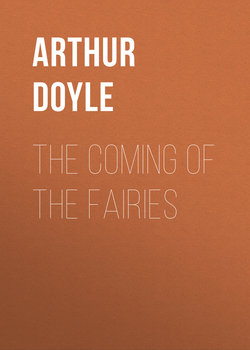The Coming of the Fairies

Реклама. ООО «ЛитРес», ИНН: 7719571260.
Оглавление
Doyle Arthur Conan. The Coming of the Fairies
PREFACE
CHAPTER I. HOW THE MATTER AROSE
CHAPTER II. THE FIRST PUBLISHED ACCOUNT – "STRAND" CHRISTMAS NUMBER, 1920
CHAPTER III. RECEPTION OF THE FIRST PHOTOGRAPHS
CHAPTER IV. THE SECOND SERIES
CHAPTER V. OBSERVATIONS OF A CLAIRVOYANT IN THE COTTINGLEY GLEN, AUGUST 1921
CHAPTER VI. INDEPENDENT EVIDENCE FOR FAIRIES
CHAPTER VII. SOME SUBSEQUENT CASES
CHAPTER VIII. THE THEOSOPHIC VIEW OF FAIRIES
Отрывок из книги
The series of incidents set forth in this little volume represent either the most elaborate and ingenious hoax ever played upon the public, or else they constitute an event in human history which may in the future appear to have been epoch-making in its character. It is hard for the mind to grasp what the ultimate results may be if we have actually proved the existence upon the surface of this planet of a population which may be as numerous as the human race, which pursues its own strange life in its own strange way, and which is only separated from ourselves by some difference of vibrations. We see objects within the limits which make up our colour spectrum, with infinite vibrations, unused by us, on either side of them. If we could conceive a race of beings which were constructed in material which threw out shorter or longer vibrations, they would be invisible unless we could tune ourselves up or tone them down. It is exactly that power of tuning up and adapting itself to other vibrations which constitutes a clairvoyant, and there is nothing scientifically impossible, so far as I can see, in some people seeing that which is invisible to others. If the objects are indeed there, and if the inventive power of the human brain is turned upon the problem, it is likely that some sort of psychic spectacles, inconceivable to us at the moment, will be invented, and that we shall all be able to adapt ourselves to the new conditions. If high-tension electricity can be converted by a mechanical contrivance into a lower tension, keyed to other uses, then it is hard to see why something analogous might not occur with the vibrations of ether and the waves of light.
This, however, is mere speculation and leads me to the fact that early in May 1920 I heard, in conversation with my friend Mr. Gow, the Editor of Light, that alleged photographs of fairies had been taken. He had not actually seen them, but he referred me to Miss Scatcherd, a lady for whose knowledge and judgment I had considerable respect. I got into touch with her and found that she also had not seen the photographs, but she had a friend, Miss Gardner, who had actually done so. On May 13 Miss Scatcherd wrote to me saying that she was getting on the trail, and including an extract from a letter of Miss Gardner, which ran as follows. I am quoting actual documents in this early stage, for I think there are many who would like a complete inside view of all that led up to so remarkable an episode. Alluding to her brother Mr. Gardner, she says:
.....
My most earnest critics came from among the spiritualists, to whom a new order of being as remote from spirits as they are from human beings was an unfamiliar idea, and who feared, not unnaturally, that their intrusion would complicate that spiritual controversy which is vital to so many of us. One of these was a gentleman whom I will call Mr. Lancaster, who, by a not unusual paradox, combined considerable psychic powers, including both clairvoyance and clairaudience, with great proficiency in the practice of his very prosaic profession. He had claimed that he had frequently seen these little people with his own eyes, and I, therefore, attached importance to his opinion. This gentleman had a spirit guide (I have no objection to the smile of the sceptic), and to him he referred the question. The answer showed both the strength and the weakness of such psychic inquiries. Writing to me in July 1920, he said:
These psychic impressions and messages are often as from one who sees in a glass darkly and contain a curious mixture of truth and error. Upon my submitting this message to Mr. Gardner he was able to assure me that the description was, on the whole, a very accurate one of Mr. Snelling and his surroundings, the gentleman who had actually handled the negatives, subjected them to various tests and made enlarged positives. It was, therefore, this intermediate incident, and not the original inception of the affair, which had impressed itself upon Mr. Lancaster's guide. All this is, of course, quite non-evidential to the ordinary reader, but I am laying all the documents upon the table.
.....